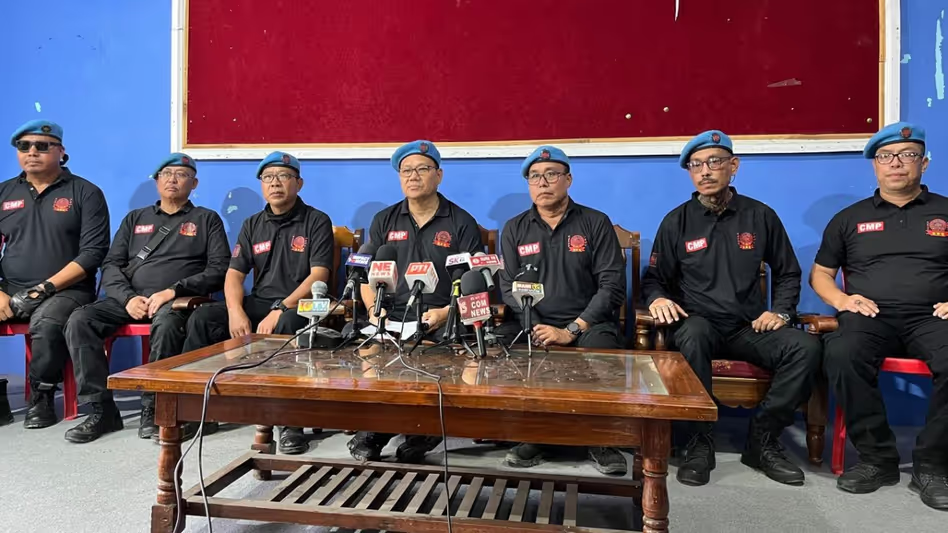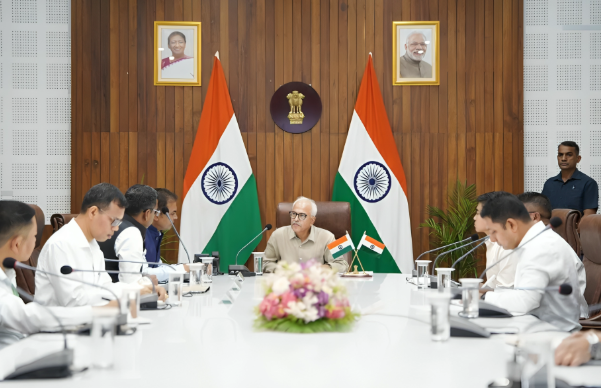Arambai Tenggol Supports Illegal Immigration Memorandum in Manipur
Summary
On February 25, 2025, the Meitei organization Arambai Tenggol submitted a comprehensive memorandum to Manipur Governor Ajay Kumar Bhalla, calling for the deportation of illegal immigrants, implementation of the National Register of Citizens (NRC) with 1951 as the base year, strengthened border fencing along the India–Myanmar frontier, destruction of poppy plantations, abrogation of the Suspension of Operations (SoO) pact with militias, and withdrawal of Scheduled Tribe (ST) status from undocumented immigrants. The group also voluntarily surrendered 246 weapons under the government’s appeal, seeking peace and political leverage to act on their demands
Why the Memorandum Now? Demands, Disarmament, and Motivation
At the heart of this story is the February 25, 2025 meeting between AT leaders and Governor Ajay Kumar Bhalla, during which a list of demands was submitted. Let’s explore the chronology:
- Disarmament
Acting on the Governor’s appeal, AT surrendered 246 weapons, including looted and illegal arms. The voluntary act was also symbolic—a gesture to build trust and secure leverage for their terms - The List of Demands
- Complete Indo–Myanmar border fencing to prevent illegal immigration, arms, poppy and drug smuggling.
- Rollout of NRC with 1951 as the base year, targeting undocumented immigrants.
- Deportation of illegal immigrants and revocation of ST status to those deemed non-resident.
- Destruction of poppy plantations, a source of narcotics trade.
- Abrogation of Suspension of Operations (SoO) pact with Kuki insurgent groups if it permits militants to operate freely.
- No legal action against AT and allied village volunteers, forming de facto immunity.
- Amendment in the MLR & LR Act, 1960 for equal application in both hill and valley regions.
- Reinstatement of ST status for indigenous Meitei/Meetei community
AT’s moves weren’t just rhetoric—they set ambition by placing their guns on the table while demanding state-level concessions.
Amnesties and the Call for No Legal Action
One controversial item: AT demanded that no legal action be taken against its members or allied village volunteers. In effect, this seeks retroactive immunity for past violence or militant behavior—something the Governor reportedly indicated he’d “consider” during talks
That creates tension: can peace be brokered without accountability? Or is it a pragmatic compromise to de-escalate tensions?
After the Memorandum: Fallout, Clashes, and Law Enforcement Responses
Despite AT’s disarmament gesture, tensions persisted. Several members were arrested post-memorandum:
- On July 9, 2025, six AT cadres were arrested in connection with violence during a bandh and assault on police. Clashes with militants led to broader counteractions
- Earlier arrests tied to violence and a kidnapping-murder case included AT members—pointing to continued associations with crime despite public overtures
Law enforcement also introduced novel approaches. Instead of punishing ‘misguided youths’ involved in protest-led violence, authorities offered community service—a rehabilitative move under the Bharatiya Nagrik Suraksha Sanhita (BNSS), with protesters cleaning roads rather than serving jail time
Frequently Asked Questions
- What is Arambai Tenggol, and why did they meet the Governor?
Arambai Tenggol is a Meitei activist organization with large volunteer strength and armed wings. They met the Governor on February 25, 2025 to submit a memorandum demanding border fencing, NRC, deportation of illegal immigrants, and other policy actions, in exchange for surrendering arms. - What does implementing NRC with 1951 as the base year entail?
It means recognizing citizens recorded in the 1951 census and above, identifying illegal immigrants who arrived after that. This could be used to revoke undocumented immigrants’ rights and alter demographic dynamics. - Why did Arambai Tenggol demand no legal action against its members?
They sought de facto immunity from prosecution in return for surrendering weapons. While the Governor indicated this would be considered, legal and ethical implications remain contested. - Did violence involving AT members stop after the memorandum?
No. Subsequent arrests—like in July 2025 for assaults during bandh and kidnapping-murder allegations—demonstrated continued involvement in criminal activities despite peace gestures. - What are the risks of meeting militia demands with policy concessions?
It can undermine rule of law, alienate ethnic minorities, encourage future armed bargaining, and complicate state sovereignty if not paired with judicial oversight and inclusive governance.



